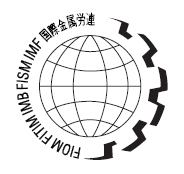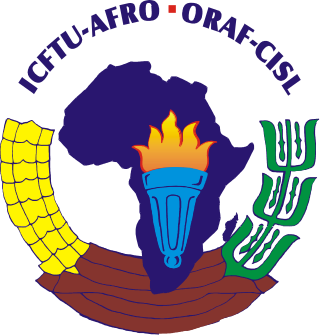Related Research Articles

The International Confederation of Free Trade Unions (ICFTU) was an international trade union. It came into being on 7 December 1949 following a split within the World Federation of Trade Unions (WFTU), and was dissolved on 31 October 2006 when it merged with the World Confederation of Labour (WCL) to form the International Trade Union Confederation (ITUC).

The World Federation of Trade Unions (WFTU) is an international federation of trade unions established in 1945. Founded in the immediate aftermath of World War Two, the organization built on the pre-war legacy of the International Federation of Trade Unions as a single structure for trade unions world-wide. With the emergence of the Cold War in the late 1940s, the WFTU splintered, with most trade unions from the Western-aligned countries leaving and creating the International Confederation of Free Trade Unions (ICFTU) in 1949. Throughout the Cold War, membership of the WFTU was made up predominantly of trade unions from the Soviet-aligned and non-aligned countries. However, there were notable exceptions to this, such as the Yugoslav and Chinese unions, which departed following the Tito-Stalin and Sino-Soviet splits, respectively, or the French CGT and Italian CGIL unions, who were members. With the end of the Cold War and the dissolution of the Soviet Union, the WFTU lost the largest portion of its membership and financial support. Since the start of the 2000s, the organization shifted headquarters to Athens and recruited new members, claiming to have grown from representing 48 million workers in 2005 to 105 million in 2022.

The World Confederation of Labour (WCL) was an international labour organization founded in 1920 and based in Europe. Fascist governments of the 1930s repressed the federation and imprisoned many of its leaders, limiting operations until the end of World War II. In 2006 it became part of the International Trade Union Confederation (ITUC), ending its existence as an independent organization.
Education International (EI) is a global union federation (GUF) of teachers' trade unions consisting of 401 member organizations in 172 countries and territories that represents over 30 million education personnel from pre-school through university. It is one of the world's largest sectoral global union federations.

The International Metalworkers' Federation (IMF) was a global union federation of metalworkers' trade unions, founded in Zürich, Switzerland in August 1893. As of 2009, the IMF had more than 200 member organisations in 100 countries, representing a combined membership of 25 million workers.

The ITUC Regional Organisation for Africa (ITUC-Africa) is a regional organisation of the International Trade Union Confederation, representing trade unions from countries in Africa. There are 56 national trade union federations affiliated to ITUC-Africa, from 45 countries, and representing a total of 15 million workers.
The Liberian Federation of Labor Unions (LFLU) is a national trade union center in Liberia. It was formed in 1980 by the merging of the United Workers' Congress and the Liberian Federation of Trade Unions.

The International Trade Union Confederation (ITUC) is the world's largest trade union federation.

The ICFTU African Regional Organisation (AFRO) was a regional organisation of the International Confederation of Free Trade Unions (ICFTU), representing trade unions from countries in Africa.

The International Federation of Trade Unions was an international organization of trade unions, existing between 1919 and 1945. IFTU had its roots in the pre-war IFTU.
Liga Geral dos Trabalhadores de Angola was an Angolan trade union organization in exile. Being based amongst Angolan refugees in neighbouring Congo-Kinshasa, LGTA was linked to the National Liberation Front of Angola (FNLA). During the 1960s, LGTA was the largest Angolan trade union outfit.
The Somali Confederation of Labour was a national trade union centre in Somalia. CSL was founded in 1949. CSL was closely linked to the ruling Somali Youth League, but retained organizational independence.
The Plantation Workers International Federation was an international trade secretariat of the International Confederation of Free Trade Unions. PWIF was founded at the firth ICFTU world congress held in Tunis in July 1957. Samuel Powell Claret was appointed as the general secretary of PWIF and Tom Bavin as its Director of Organisation. PWIF was launched by ICFTU to organize plantation unions in the Third World.
The Labor Congress of Liberia was a trade union centre in Liberia. It was one of the precursors of the Liberian Federation of Trade Unions (LFTU).
The United Workers Congress of Liberia was a trade union centre in Liberia.
The Liberian Federation of Trade Unions was a trade union centre in Liberia.
Jacobus Hendrik Oldenbroek was a Dutch trade union leader and politician, who served as general secretary of the International Confederation of Free Trade Unions.
The International Federation of Petroleum and Chemical Workers (IFPCW) was a global union federation bringing together trade union representing workers in the chemical and oil industries.
Trade unions in The Gambia are regulated under the Labour Act 2007. The first trade union was the Bathurst Trade Union (BTU), founded in 1929, which led a general strike that year. General strikes were also led by the Gambia Workers' Union (GWU) in 1960, 1961, 1967, and 1970, although not all were successful. There are three trade union centres in The Gambia: the Gambia Trade Union Bureau (GamTUB), the Gambian Workers' Confederation (GWC), and the Gambia National Trade Union Congress (GNTUC). The country joined the International Labour Organization (ILO) in 1995.

George Leon-Paul Weaver was an American labor leader, active in promoting civil rights both in the US and internationally. After serving as Assistant Secretary of Labor for International Affairs in both the Kennedy and Johnson administrations, he was in 1968 elected chair of the governing body of the UN's International Labour Organization. He was the first American to be named "Honorary Commander" in the Order of the Defender of the Realm, a Malaysian federal award for meritorious service to the country.
References
- 1 2 3 4 5 6 7 International Federation of Petroleum and Chemical Workers. Report of General Secretary to the 1st- World Congress. pp. 61–63.
- ↑ United States. Bureau of International Labor Affairs; United States. Bureau of Labor Statistics (1966). Directory of labor organizations: Africa. For sale by the Superintendent of Documents, U.S. Govt. Print. Off. pp. 19–3.
- ↑ United States. Embassy (Liberia) (1967). Embassy of the United States of America. p. 24.
- ↑ Asia & Africa Review. Vol. 13–14. Independent Publishing Company. 1973.
- ↑ ILO. INTERNATIONAL LABOUR ORGANISATION THIRD AFRICAN REGIONAL CONFERENCE ACCRA DECEMBER 1969 Archived 2017-08-17 at the Wayback Machine
- ↑ International Federation of Petroleum and Chemical Workers. World Congress (1970). Proceedings of the ... World Congress. The Federation. p. viii.
- ↑ A. P. Coldrick; Philip Jones (1979). The international directory of the trade union movement. Macmillan. p. 297.
- ↑ African Trade Union News. Regional Economic Research and Documentation Center. 1978. p. 90.
- ↑ United States. Embassy (Liberia); United States. Bureau of International Labor Affairs (1989). Liberia. U.S. Department of Labor, Bureau of International Labor Affairs. p. 5.
- ↑ Ilc 76 – Record of Proceedings. International Labour Organization. 1990. p. 29. ISBN 978-92-2-106669-9.
- ↑ All-Liberia National Conference (1991). Final Report on the Proceedings of the All-Liberia National Conference, Unity Conference Center, Virginia, Liberia, March 15th-April 20th, 1991. publisher not identified. p. 40.
- ↑ "The Perspective, 22 April 2004". The Perspective. 22 April 2004. Retrieved 25 May 2023.